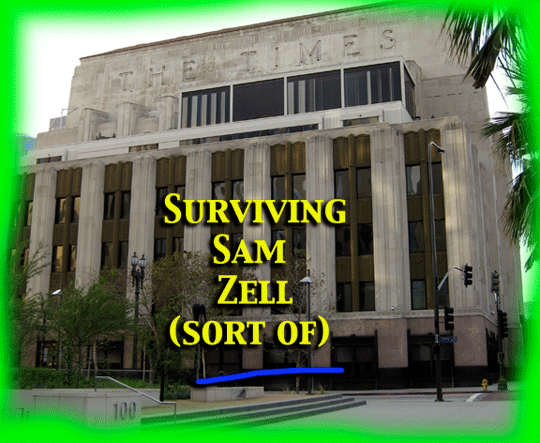Former LA Times theater critic, Laurie Winer, has ostensibly written a review of James O’Shea’s book, The Deal From Hell: How Moguls and Wall Street Plundered Great American Newspapers, in which he chronicles real estate tycoon Sam Zell’s raping and pillaging of the Tribune Corp. in general and of the Los Angeles Times in specific.
But really, Winer has done something that is far better and more informative than a mere review: She has recapitulated for us—in a releavingly graspable way— the catastrophe for newspapers that was/is Sam Zell, and the events leading up to his wrecking ball tenure that made Zell’s takeover possible. Into all of this, Winer has interwoven her own front row remembrances and observations. We get to feel what it was like to watch the madness close up.
Winer’s essay/review appears in the Los Angeles Review of Books. For any of us who care about journalism, it’s a BIG must read.
Here’s an emblematic clip:
…Zell addressed the staff of the Orlando Sentinel, one of the Tribune newspapers, on January 31, 2008, which was the first time most of the journalists in the Tribune family got to see the man himself. As part of a whistle-stop tour of his new properties, Zell took visible delight in showing off his iconoclastic style to a new industry that, before now, had not had the pleasure. He was primed and ready for his close-up. He took the stage and stood at a lectern, a leprechaun-sized, wizened, bald man with a white goatee and gravelly voice.
According to Zell, “the eleventh commandment is Thou shalt not take oneself seriously.” His public posture was combative but laced with impish mischief; the gleam in his eye suggested he enjoyed being challenged. This may have misled Orlando Sentinel photographer Sara Fajardo, or perhaps she had seen the new employee handbook rewritten on orders of Zell. One of its entries read: “Question authority and push back if you do not like the answer. You will earn respect, and not get into trouble for asking tough questions.”
In any event, there Zell is in Orlando, telling his staff about the necessity of making money, how that would be our top priority going forward. Fajardo did what none of us attempted with Mark Willes; she stood up and asked her new boss about his view on “the role journalism plays in the community, because we’re not the Pennysaver, we’re a newspaper.” Zell placed both hands on the podium and bent his elbows, as if he wanted to push it forward. “I want to make enough money so that I can afford you,” he said, his irritation mounting. “It’s really that simple. You need to in effect help me by being a journalist that focuses on what our readers want and that therefore generates more revenue.” Fajardo immediately broke in, “But what readers want are puppy dogs,” she said, as the courage drains from her voice. “We also need to inform the community.” Zell cut her off, his right hand gesticulating forcefully. “I’m sorry but you’re giving me the classic, what I would call, journalistic arrogance, by deciding that puppies don’t count. … What I’m interested in is how can we generate additional interest in our products and additional revenue so we can make our product better and better and hopefully we get to the point where our revenue is so significant that we can do puppies and Iraq. Okay?”
The audience, some of whom applauded, might have been momentarily perplexed by Zell’s concept: That, like a kid who must endure being “grounded” before he can go to parties again, a newspaper would have to sell its very soul so that, at some undetermined point in the future, it might be allowed to go back to being a newspaper again. If anyone was busy contemplating the conundrum of Zell’s argument, he might have missed the day’s dramatic high point, which occurred when Fajardo turned around to sit back down. Zell had two more words for her. They were: “Fuck you.”
Fortunately, it lives on YouTube.
I watched the video of this event over and over. What mesmerized me was the sight of a man so unprepared for his come-to-Jesus moment that he had no idea it had arrived. Where Murdoch had his ducks in place in a formation that any dictator might envy, Zell had only his anger at everyone who had ever criticized him, who had ever doubted that accumulating wealth, by itself, was proof of ethics, intelligence, or general marvelousness.
Now read the rest. Immediately, if possible.

